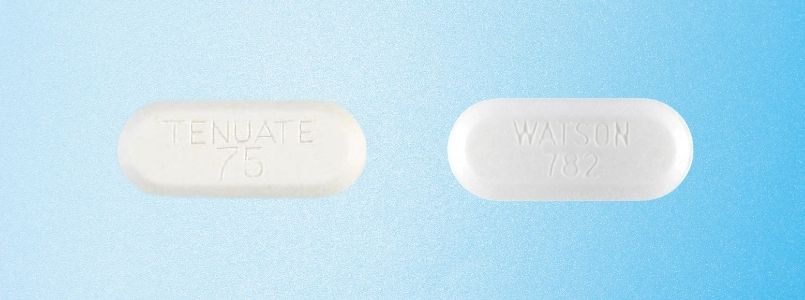Tenuate: a short-term treatment for obesity
Tenuate is a medication that may be beneficial for obese adults who want to lose weight.
As part of our series of articles, we will look in detail at the efficacy and safety of Tenuate to help you decide if it is right for you.
If you are considering both Tenuate and phentermine, please have a look at our detailed comparison article.
What is Tenuate?
Tenuate is a US Food and Drug Administration (FDA) approved medical appetite suppressant. It is only recommended for adults with a body mass index (BMI) of 30 or higher who have not lost weight through diet and exercise alone.
Tenuate contains the ingredient diethylpropion, a stimulant with similarities to amphetamine. It rouses the central nervous system (CNS), increasing the heart rate and blood pressure, and decreasing the appetite (
Both doses are manufactured by Patheon Pharmaceuticals Inc., based in Cincinnati, Ohio (
What does Tenuate Look Like?
Tenuate is a white, oval-shaped pill imprinted with WATSON 782. Tenuate Dospan is also white and oval but is imprinted with TENUATE 75.

How does it work?
The active ingredient in Tenuate is diethylpropion. This drug acts on the central nervous system to boost metabolism by increasing blood pressure and heart rate. It is also considered an anorectic drug, helping to reduce the appetite and, therefore, aiding weight loss (
Tenuate 25mg should be taken three times daily one hour before meals, as its effect only lasts for a few hours. Sustained-release Tenuate 75mg releases diethylpropion more slowly into the body so that only one pill is needed each day.
How much weight can I lose?
In a clinical study, taking diethylpropion for 12 months, alongside a hypocaloric diet, leading to clinically significant weight loss. Obese participants who took the drug lost an average of 9.8% of their baseline body weight. For those taking a placebo, the average weight reduction was only 3.7%. Furthermore, participants who took a placebo for six months but then switched to diethylpropion for the remainder of the study lost more weight during these second six months (
Another study showed that participants taking diethylpropion lost an average of 11.6 lbs in 12 weeks, although there was evidence that tolerance to the medication began between weeks 8 and 12 (
How should I take Tenuate?
For immediate release Tenuate, the dosage is 25mg taken three times daily one hour before food.
For sustained-release Tenuate Dospan, one 75mg tablet should be swallowed the whole mid-morning.
For best results, you should also follow a mildly hypocaloric diet.
The medication is only approved by the FDA for use for 12 weeks. After this time, the risk of serious adverse events increases (
Does Tenuate have side effects?

The most common side effects are a dry mouth, feeling restless or nervous, a tremor, difficulty sleeping, dizziness, tiredness, nausea, vomiting, and low mood.
Unfortunately, more serious adverse effects can occur when taking the medication. These include:
- Pulmonary hypertension
- Valvular heart disease.
If you are concerned about these complications, you must speak to your doctor for medical advice (
What should I avoid when taking Tenuate?
Tenuate will not be the right drug for everyone. You should familiarize yourself with the contraindications and possible drug interactions before starting this weight management aid.
Precautions
Tenuate is unsuitable for adults with cardiovascular disease, high blood pressure, and heart rhythm abnormalities. Your doctor may also advise against this treatment if you have epilepsy. Diethylpropion should not be used if you have hyperthyroidism or glaucoma, and it is rarely advised for women who are pregnant or breastfeeding (
As diethylpropion can make you feel tired or dizzy, it may not suit you if you drive a vehicle or operate machinery (
Drug interactions
Some medications can interact with Tenuate. Antidepressants, including MAOI medications, phenothiazines, antidiabetic drugs, and antihypertensive, can all interact with diethylpropion. Your doctor may therefore recommend a different drug.
Alcohol should be avoided when taking Tenuate (
Should you try Tenuate?
The active ingredient in Tenuate, diethylpropion, has been shown to lead to greater weight reduction than diet and exercise alone. It is approved as a short-term treatment for obesity, but extended treatment is often not recommended due to the risk of adverse health outcomes.
Taking Tenuate may offer a good solution to start your journey towards a healthy weight, before continuing with a hypocaloric diet and exercise long-term.
You might be interested to learn more about the other weight management medications that are currently available. We further recommend reading our in-depth comparison of Tenuate vs phentermine.
FAQs
What are the other purposes of Tenuate?
Tenuate is an appetite suppressant. If you successfully lose 5-10% of your body weight, other health benefits may include lower blood pressure, reduced cholesterol levels, and better control of blood sugars.
Which diet pill is better, Bontril or Tenuate?
Bontril and Tenuate both stimulate the CNS and act as appetite-suppressant drugs. However, more clinical trial data is available for Tenuate than for Bontril, with diethylpropion proven to lead to 9.8% average weight loss in some studies.
How can I control my diet after stopping Tenuate?
Tenuate may act to reduce the appetite and thereby make you lose weight. It is still important to eat a low-calorie diet when taking the medication so that you are already in the habit of preparing smaller, healthier meals when the drug course ends. This will aid in long-term weight loss.
How long does Tenuate take to work?
Tenuate should begin suppressing the appetite quickly. You should achieve at least one pound of weight loss per week within the first four weeks. If you have lost less than four pounds in the first month, your doctor may stop the prescription as it may not be the right drug for you (
Why does Tenuate Dospan make you feel nervous?
Tenuate Dospan is a slow-release CNS stimulator. Stimulants increase the heart rate and blood pressure and may cause tremors. These induced symptoms can trigger feelings of nervousness, and even anxiety attacks (
What is an over-the-counter alternative to Tenuate?
Natural stimulants may work in a similar way to diethylpropion. It is possible to buy natural, over-the-counter preparations that contain green coffee extract, green tea extract, or Hoodia. Alternatively, Alli is an over-the-counter weight loss drug that works by blocking fat absorption (
How does Tenuate test in a urine test?
If you were to undergo a urine screen while taking Tenuate or Tenuate Dospan, it could lead to a false positive for amphetamine. If you are undergoing drug screening, you must discuss taking Tenuate with your doctor before beginning treatment (
What is the average Tenuate price in the USA?
Tenuate Dospan has been discontinued in the USA. However, generic pills are available to purchase. At Blink Health, a one-month supply (90 pills) of generic 25mg diethylpropion costs $28.02. One month of sustained-release diethylpropion (30 tablets) can be purchased for $45.76 (
1. Rxlist.com Tenuate.
2. US Food and Drug Administration Tenuate.
3. Cercato C, Roizenblatt VA, Leança CC, Segal A, Lopes Filho AP, Mancini MC, Halpern A. A randomized double-blind placebo-controlled study of the long-term efficacy and safety of diethylpropion in the treatment of obese subjects. International Journal of Obesity. 2009; 33: 857-865.
4. Murphy JE, Donald JF, Molla AL, Crowder D. A Comparison of Mazindol (Teronac) with Diethylpropion in the Treatment of Exogenous Obesity. Journal of International Medical Research. 1975; 3 (3): 202-206.
5. Rxlist.com Tenuate Warnings.
6. Rxlist.com Tenuate Side Effects.
7. Centers for Disease Control and Prevention Losing Weight.
8. AmericanAddictionCenters.org (2023) Anxiety and Amphetamines.
9. Stohs S. and Badmaev V. A Review of Natural Stimulant and Non-stimulant Thermogenic Agents. Phytotherapy Research. 2016; 30 (5): 732-740.
10. WebMD.com (2022) Weight Loss Supplements.
11. MyAlli.com Alli.
12. Lin WL, Deng JF, Chou LJ, Hung DZ, Tsai WJ.The urinary screening and identification of amphetamines in clinical toxicology laboratory. Zhonghua Yi Xue Za Zhi (Taipei). 1991 ;48 (4) :305-9. Chinese.
13. BlinkHealth.com Generic Tenuate.
14. Drugs.com Diethylpropion Prices.

